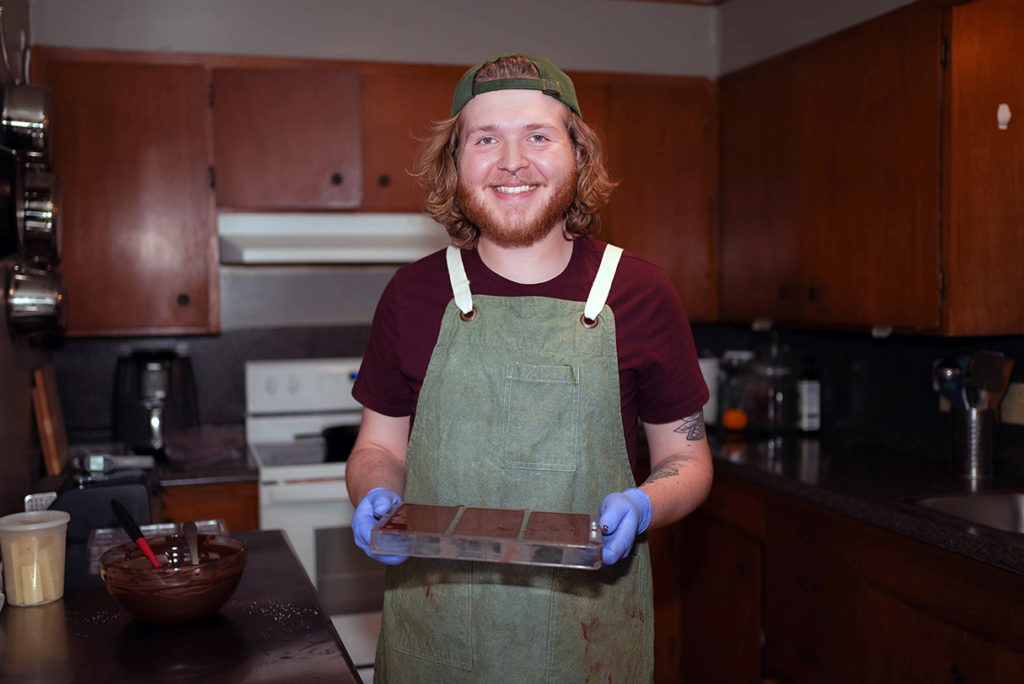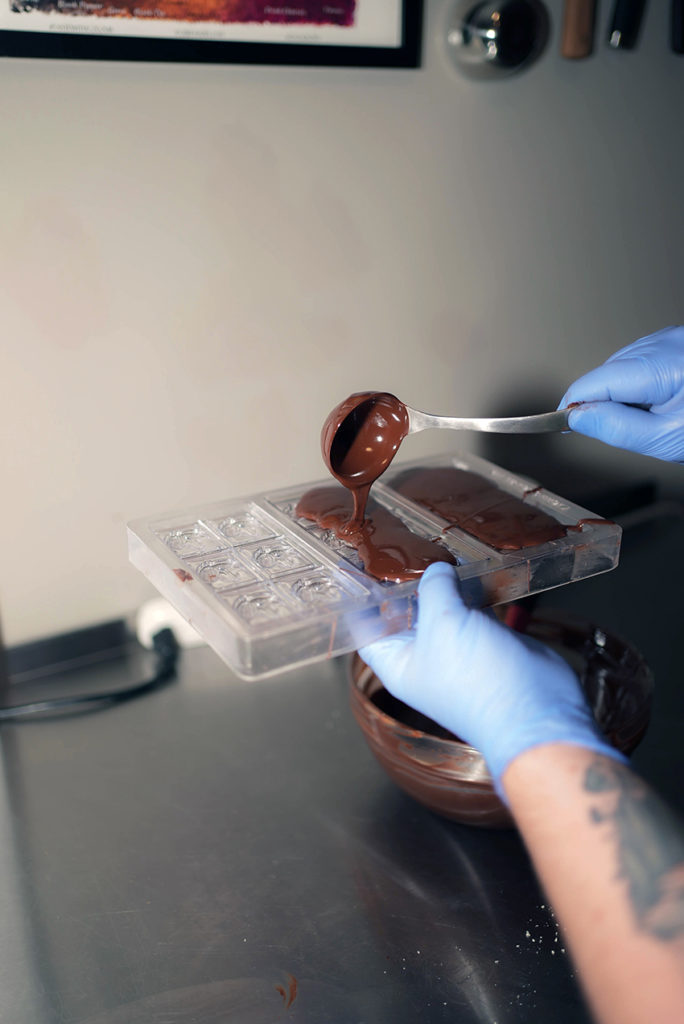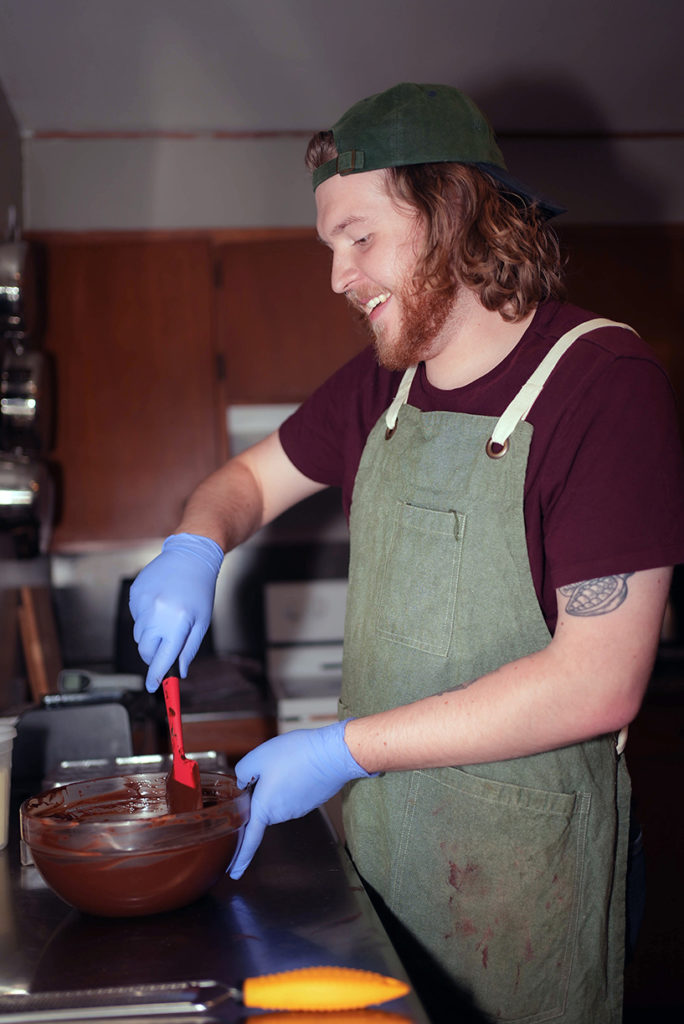Abilene Student Creates Gourmet Chocolate
Americans buy more than 58 million pounds of chocolate each year for Valentine’s Day.
And when buying chocolate, customers have many things to consider. Taste, price, aroma – just to name a few.
But how often do people take into account what went into the production of the chocolate?
Probably not as often as they should.
 Unless they’re Noah Henderson, owner and creator of Luminous Chocolate, an ethically sourced chocolate company, who knows all about the importance of thinking before buying.
Unless they’re Noah Henderson, owner and creator of Luminous Chocolate, an ethically sourced chocolate company, who knows all about the importance of thinking before buying.
According to the U.S. Department of Labor, nearly 2 million children in West African countries work in dangerous conditions at cocoa farms. Child workers are underpaid and overworked, but regardless of the job and conditions – they are children.
Is a cheap chocolate bar worth the implications?
“It’s modern-day slavery,” Noah said.
Green America reports the majority of the 3 million tons of cocoa produced each year come from those small farms. In fact, Ghana and Côte d’Ivoire alone supply nearly 70% of the world’s cocoa – where farmers and their children live on less than $1 per day.
You get what you pay for. A cliché? Maybe. Well, what if I told you a $10 chocolate bar exists here, in Abilene, providing those farmers and their families a livable wage? Would you spend the extra $9?
Noah definitely thinks it’s worth it, and lucky for us Abilenians, he’s just down the road.
“I was on a keto diet; dark chocolate was one of the few ways I would treat myself,” Noah said, explaining where his chocolate dreams began. “I got tired with how dark chocolates tasted, so I decided to make my own.”
But it was important to Noah that he didn’t make just any chocolate.
 “I did a ton of reading, and spent way more money than I should’ve on machinery and cocoa beans,” Noah said. “Over time, I realized there is a bigger need than people realize for ethically sourced chocolate that also tastes really good.”
“I did a ton of reading, and spent way more money than I should’ve on machinery and cocoa beans,” Noah said. “Over time, I realized there is a bigger need than people realize for ethically sourced chocolate that also tastes really good.”
According to Noah, a lot of chocolate companies advertise fair trade, but they don’t necessarily pay much more than commodity prices. Commodity price for cocoa beans is around $2.50 per kilogram, with fair trade being around $3.50. Noah, on the other hand, spends anywhere from $6 to $12 per kilogram on his cocoa beans.
“I pay a lot more money for my beans, which means the farmers get actual, livable wages,” Noah said.
The Cocoa Revolution
William Heyen, friend and right-hand man to Noah, said he believes Luminous Chocolate will “someday revolutionize how people conceptualize chocolate.”
“Not only is mass-produced chocolate garbage, but it’s also exploitative,” William said, “paying cocoa bean farmers pennies to the dollar and mixing all sorts of preservatives and extraneous chemicals into their products, causing the true flavor of the beans to be lost. Through supporting Noah, customers can feel good about buying the best chocolate out there and trust the entire process is carefully crafted with love.”
But can you taste love? Well, with Valentine’s Day coming up, you’ll have to taste it and try it yourself.
 “ ‘I didn’t know chocolate could taste like this,’ is typically the immediate reaction I hear from people after they taste my chocolate,” Noah said. “I hear that the most in reference to my dark chocolate – which is just cocoa beans and sugar. A lot of the flavor comes from how it’s fermented and roasted.”
“ ‘I didn’t know chocolate could taste like this,’ is typically the immediate reaction I hear from people after they taste my chocolate,” Noah said. “I hear that the most in reference to my dark chocolate – which is just cocoa beans and sugar. A lot of the flavor comes from how it’s fermented and roasted.”
Noah explained that large chocolate companies remove as much variability as possible, taking out any nuances of flavor. He, however, wants to highlight the individuality of each chocolate bar.
And that’s exactly what sets his chocolate apart.
“He does everything himself, straight from the beans grown from God’s green earth,” William said.
Sounds simple, right? Think again.
The Process
To start off, Noah takes his beans and roasts them, 2 pounds at a time. He then breaks them up, running them through a winnower – sucking the husk from the nib. Once the nibs are clean, he crushes them finely before placing them in a melanger for three to five days, adding in sugar or any flavoring. Lastly, he tempers the bars, pours them into their molds and packages them to be sold.
Arlene Kasselman is a frequent customer and supporter of Noah’s, and she’s been there since the beginning.
“I was first made aware of Luminous when my son, a friend of Noah’s, told me about it,” Arlene said. “I bought my first bar at a pop-up and was sold!”
As an entrepreneur herself, Arlene can sympathize with the difficulties behind running a small business.
“Entrepreneurship is difficult and wonderful,” Arlene said, who recently opened Seven and One Bookstore in downtown Abilene. “Buying local and small means that a creative is being propelled in their craft, causing our community to become more vibrant and rich with choices. Small business drives so much of what draws people to a community.”
Shopping small can have positive effects locally, but in this case, also globally.
“Growing the whole chocolate industry doesn’t just help my business, it helps people all across the world,” Noah said.
If you are interested in purchasing Luminous Chocolate at a local pop-up, supporting Noah and farmers across the world, you can visit @luminous_chocolate on Instagram, where he posts updates and announcements.
“I have a lot of big dreams for the future; I always want my work to do some kind of good in the world and communities around me,” Noah said. “I hope Luminous will help me do that.”
By Emily Shafer
Photos courtesy of Noah Henderson



























Leave a Reply